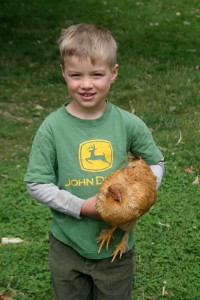In my experience, an egg with a thin shell is a problem that can be easily corrected. In order to put a shell on its egg, the chicken mainly uses calcium, phosphorus & vitamin D. If any one of these factors is missing, the bird will not be able to create a healthy shell.
Eggs with thin shells, weak shell, and even NO shells comes up as a topic every once in a while at our place. It happens to a couple birds in our flock a few times each year–encouraging me to keep up my discipline in my farm management routines.
Calcium:
Calcium is the one most people know about. It’s a good practice to offer oyster shell out for the birds as “free choice”–available 24 hours a day. Please note that oyster shell cannot substitute as grit because it will quickly disappear in the gizzards harsh conditions. Giving oyster shell instead grit can be compared to making false teeth out of chalk. Solutions:
-
Pasture your birds–grass, forbs, & bugs help round out a lopsided diet
-
Supplement with free choice oyster shell
-
Add dicalcium phosphate or mono-calcium phosphate to the feed
-
Add lime to your pasture. Acidic soils can make calcium in your soil unavailable to the plants, which the birds eat.
-
Return empty eggshells to your birds
Warning: Feeding excess calcium (i.e. in a layer ration) to non-layers (growing birds, & roosters) can cause joint problems.
Phosphorus:
The second, and equally important factor is phosphorus. When we moved to our farm, we had several soil samples analyzed and one thing that came out of it was a glaring lack of phosphorus. The rains here in the Pacific Northwest will gradually wash away the soil’s phosphorus, and it is a common deficiency for our area.
-
Pasture your birds
-
Add dicalcium phosphate or mono-calcium phosphate to the feed
-
Add lime to your pasture (phosphorus is more available in sweet soils)
-
Grow phosphorus enabling forage crops: buckwheat, or comfrey.
-
Add phosphorus to your pasture (chicken manure, compost, seaweed)
-
Return empty eggshells to your birds
Vitamin D:
This is found in green plants & fish oils, and is one of the reasons you feel good after having some time outside in the sunshine. People need it for strong bones, and layers need it for strong shells. Vitamin D is the enabler which helps the body assemble the calcium & phosphorus building blocks
- Pasture your birds–forbs, grasses & bugs are good sources of vitamin D
- Beef liver
- Skim milk or whey (soak the feed in it)
- Feed the birds something green if pasturing is not an option
Water:
Offer rainwater, or filtered water whenever possible instead of tap water. The chlorine & fluoride in municipal water supplies interferes with eggshell & bone formation because it upsets the body’s correct mineral balance.
Stress:
Changes in feed, living conditions, or daily routine can make a chicken lay an egg too early, or stop laying altogether. If a bird is being harassed by dogs or being chased by children you may also find harmless, but unappealing blood specks on the yoke.
Breeds:
Some birds are just easier keepers than others. The ones that work best at our place tend to be the smaller breeds which are more aggressive foragers.
See also: http://edis.ifas.ufl.edu/vm013

